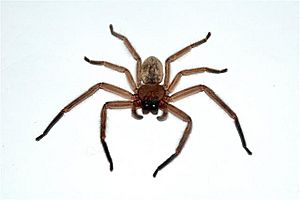Delena facts for kids
Quick facts for kids Delena |
|
|---|---|
 |
|
| Delena cancerides (female) | |
| Scientific classification |
|
| Kingdom: | Animalia |
| Phylum: | Arthropoda |
| Subphylum: | Chelicerata |
| Class: | Arachnida |
| Order: | Araneae |
| Infraorder: | Araneomorphae |
| Family: | Sparassidae |
| Genus: | Delena Walckenaer, 1837 |
| Type species | |
| D. cancerides Walckenaer, 1837
|
|
| Species | |
|
11, see text |
|
| Synonyms | |
|
|
Delena is a group of amazing huntsman spiders. They live in the South Pacific region. A scientist named Charles Athanase Walckenaer first described them in 1837.
Contents
What are Delena Spiders?
Delena spiders are known for being flat. This helps them hide in small spaces. They are part of the larger group of huntsman spiders. These spiders are often quite large. They have long, strong legs.
Where do Delena Spiders Live?
Most Delena spiders live in Australia and New Zealand. They are found in different parts of these countries. Some species live in Tasmania, an island state of Australia. They like to live under bark or rocks.
How Many Types of Delena Spiders Are There?
As of September 2019, there are eleven known types, or species, of Delena spiders. The most famous one is the Delena cancerides. This spider is found in Australia, Tasmania, and New Zealand. It was the first Delena spider discovered.
- Delena cancerides – Found in Australia, Tasmania, and New Zealand.
- Other species are found in different parts of Australia. For example, Delena convexa lives in Western Australia. Delena gloriosa is found in South Australia.
What Do Delena Spiders Eat?
Like other huntsman spiders, Delena spiders are predators. This means they hunt other creatures for food. They mostly eat insects. They do not build webs to catch their prey. Instead, they actively chase and pounce on their food.
Are Delena Spiders Dangerous?
Delena spiders are generally not dangerous to humans. They might bite if they feel threatened. However, their bite is usually not serious. It might cause some pain or swelling. They prefer to run away rather than bite.
Images for kids
 | DeHart Hubbard |
 | Wilma Rudolph |
 | Jesse Owens |
 | Jackie Joyner-Kersee |
 | Major Taylor |


